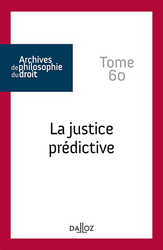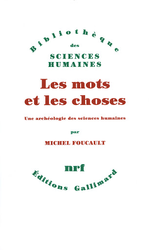Nov. 21, 2018
Publications

Référence générale : Frison-Roche M.-A., Pour protéger les êtres humains, l'impératif éthique de la notion juridique de personne, in in "Droit et Ethique" (dossier spécial des Archives de Philosophie du Droit) Archives de Philosophie du droit (APD), La justice prédictive, Dalloz, 2018, z, pp. 363-378.
Résumé : C'est par le Droit que l'être humain a acquis en Occident une unité (I). Ce que la Religion avait pu faire, le Droit l'a également fait en posant sur chaque être humain la notion indétachable de lui de « personne » (I.A). Mais c'est cela qui est remis en cause aujourd'hui, non pas la personnalité et le pouvoir que l'être humain a d'exprimer sa liberté mais l'unité que cela implique dans la disposition que l'on a de soir en repoussant le désir qu'autrui a toujours eu de disposer de nous. Le Droit actuel tend en effet à « pulvériser » les êtres humains en données et à transformer en prestations juridique de « consentement », cessant d'être une preuve d'une volonté libre mais devenue une notion autonome , y suffirait (I.B.).
Pour empêcher que ne règne plus que la « loi des désirs », laquelle ne fait que traduire l'ajustement des forces, il faut requérir ici et maintenant la souveraineté éthique du Droit, parce que le Droit ne peut pas être qu'une technique d'ajustement des intérêts (II). L'on peut former cette requête si l'on ne veut pas vivre dans un univers a-moral (II.A), si l'on constate que l'unité de la personne est l'invention juridique qui protège l'être humain faible (II.B.). Si on en admet l'impératif, il faut alors se demander enfin qui en Droit va l'exprimer et l'imposer, notamment de la Loi, ou du Juge, car nous semblons avoir perdu la capacité de rappeler ce principe de la Personne sur laquelle l'Occident fut si centré. Or, les principes qui ne sont plus dits disparaissent. Il ne resterait plus alors que l'ajustement au cas par cas des intérêts entre êtres humains dans champ mondial des forces particulières. À cette aune, le Droit ne serait plus qu'une technique de sécurisation des ajustements particuliers. (II.C). Réduit à cela, le Droit aurait perdu son lien avec l'Éthique.
Consulter une présentation de l'ouvrage dans lequel l'article est publié.
Voir la présentation d'autres tomes des Archives de Philosophie du Droit.

Updated: Sept. 8, 2018 (Initial publication: April 30, 2018)
Publications

► This working document was intended to serve as a support for a conference pronounced in French in the conference Droit et Ethique ( Law & Ethics) of May 31, 2018 in a symposium organized by the Court of Cassation and the Association Française de Philosophie du Droit. French Association of Philosophy of Law on the general theme Law & Ethics.
See a general presentation of this conference.
Rather, it has served as a support for the article to be published in the Archives de Philosophie du Droit (APD). This article is written in French.
► Summary: It is through the Law that the human being has acquired a unity in the West (I). What religion could have done, the Law also did by posing on each human being the indetachable notion of him of "person" (I.A). But this is what is challenged today, not the personality and the power that the human being has to express his freedom but the unity that implies in the disposition that we have of ourselves in repelling the desire that others have always had to dispose of us. Current law tends to "pulverize" human beings into data and transform into neutral legal services what was considered before as the devouring of others. The legal concept of "consent", ceasing to be proof of a free will but becoming an autonomous concept, would suffice (I.B.).
To prevent the reigning of the "law of desires", which merely reflects the adjustment of forces, we must demand here and now the ethical sovereignty of Law, because Law can not be just just be just the interests adjustment (II). We can form this request if we do not want to live in an a-moral universe (II.A), if we see that the unity of the person is the legal invention that protects the weak human being (II.B.). If we admit this imperative, then we must finally ask who in the legal system will express and impose it, especially the legislator or the judge, because we seem to have lost the ability to recall this principle of the Person on which the West was so centered. But the principles that are no longer said disappear. There would then remain only the case-by-case adjustment of interests between human beings in the world field of particular forces. At this yardstick, Law would be more than a technique of securisation of particular adjustments. Law would be reduced at that and would have lost its link with Ethics. (II.C).

Updated: Oct. 25, 2017 (Initial publication: May 27, 2016)
Publications

► Full Reference: Frison-Roche, M.-A., Globalization from the point of view of Law, working paper, May 2017.
____
🎤 This working paper initially served as a basis for a synthesis report made in French in the colloquium organized by the Association Henri Capitant in the International German Days on the subject of "Le Droit et la Mondialisation" (Law and Globalization).
📝 Il sert dans un second temps de base à l'article paru dans l'ouvrage La Mondialisation.
📝 it serves as a second basis for the article (written in English, with a Spanish Summary) to be published in the Brezilian journal Rarb - Revista de Arbitragem e Mediação (Revue d`Arbitrage et Médiation).
It uses the Bilingual Dictionary of the Law of Regulation and Compliance.
____
► Summary of the Working: Globalization is a confusing phenomenon for the jurist. The first thing to do is to take its measure. Once it has been taken, it is essential that we allow ourselves to think of something about it, even if we have to think about it. For example, on whether the phenomenon is new or not, which allows a second assessment of what is taking place. If, in so far as the law can and must "pretend" to defend every being, a universal claim destined to face the global field of forces, the following question - but secondary - is formulated: quid facere? Nothing ? Next to nothing ? Or regulate? Or can we still claim that the Law fulfills its primary duty, which is to protect the weak, including the forces of globalization?
____
read the Working Paper below⤵️
April 21, 2017
Blog

Through the Open Culture website, it is possible to listen to Hayao Miyazaki who, in March 2017, claimed that video games whose drawings are made on Artificial Intelligence basis are "insults to life".
Read below the history, the words that the Master has held, his conception of what is creation and "truly human" work, which is echoed by the definitions given by Alain Supiot, who also reflected on what robots do.
This brings us back to the very notion of "creation" and creative work.
_____
Read below
Updated: July 31, 2013 (Initial publication: Dec. 6, 2011)
Teachings : Les Grandes Questions du Droit, semestre d'automne 2011

April 8, 1966
Thesaurus : Doctrine

► Référence complète : Foucault, M., Les mots et les choses. Une archéologie des sciences humaines, collection des sciences humaines, Gallimard, 1966, 404 p.
____
► Texte de la 4ième de couverture : Les sciences humaines d'aujourd'hui sont plus que du domaine du savoir : déjà des pratiques, déjà des institutions. Michel Foucault analyse leur apparition, leurs liens réciproques et la philosophie qui les supporte. C'est tout récemment que l'«homme» a fait son apparition dans notre savoir. Erreur de croire qu'il était objet de curiosité depuis des millénaires : il est né d'une mutation de notre culture. Cette mutation, Michel Foucault l'étudie, à partir du XVIIe siècle, dans les trois domaines où le langage classique - qui s'identifiait au Discours - avait le privilège de pouvoir représenter l'ordre des choses : grammaire générale, analyse des richesses, histoire naturelle. Au début du XIXe siècle, une philologie se constitue, une biologie également, une économie politique. Les choses y obéissent aux lois de leur propre devenir et non plus à celles de la représentation. Le règne du Discours s'achève et, à la place qu'il laisse vide, l'«homme» apparaît - un homme qui parle, vit, travaille, et devient ainsi objet d'un savoir possible.
Il ne s'agit pas là d'une «histoire» des sciences humaines, mais d'une archéologie de ce qui nous est contemporain. Et d'une conscience critique : car le jour, prochain peut-être, où ces conditions changeront derechef, l'«homme» disparaîtra, libérant la possibilité d'une pensée nouvelle.".